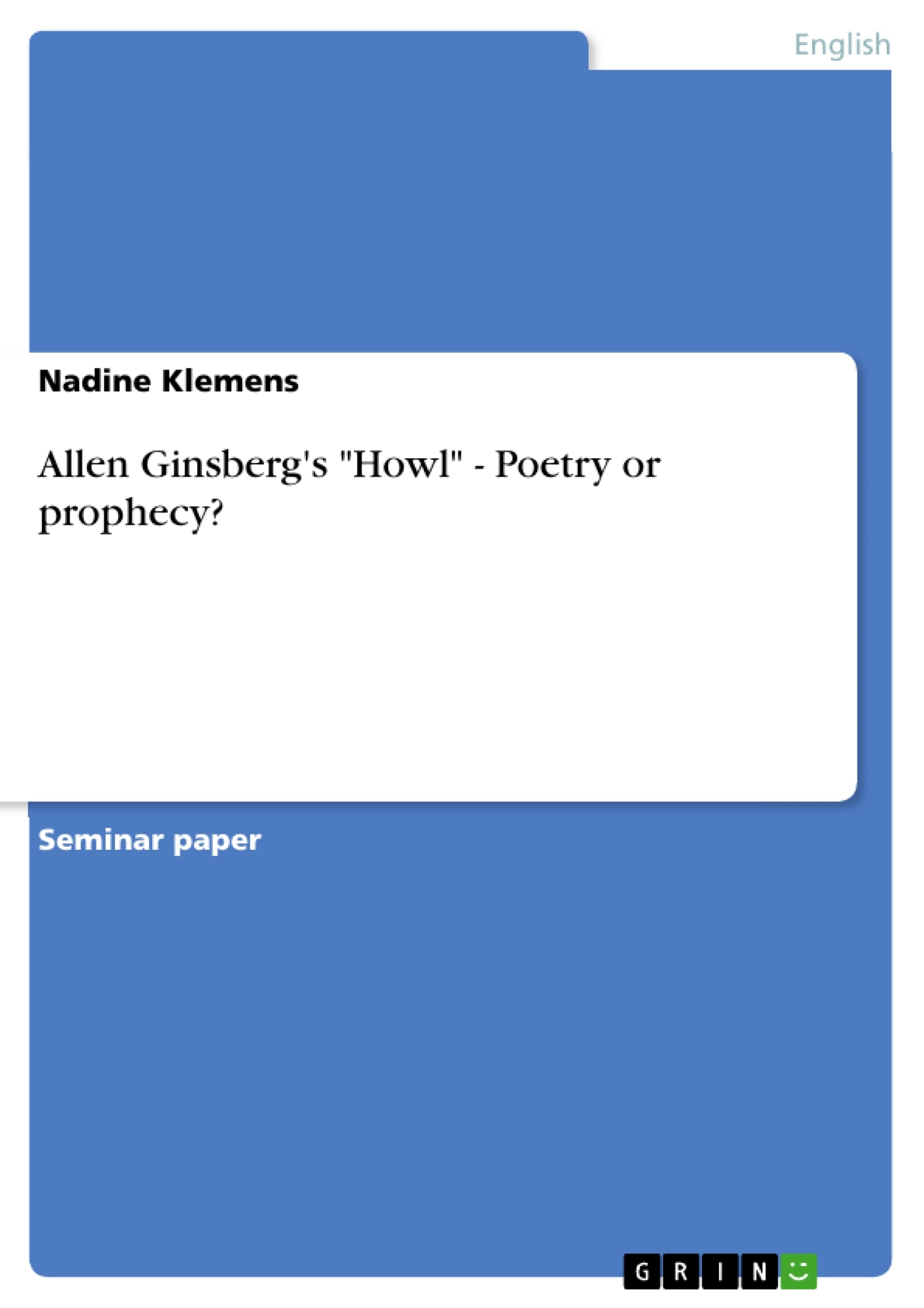Allen Ginsberg’s reputation as a major poet is now secure; he has outlived the other major poets of mid-century with whom he is frequently compared, such as Charles Olson, Robert Lowell, and Frank O’Hara, who with Ginsberg make up a core of writers that revolutionized the writing of American verse in the 1950s. […] Each of these major writers gave to the main currents of verse his own unique voice and intelligence, but it was Ginsberg especially who seems to have awakened America’s youth to the powers of poetry to make stirring prophecies and to reinvigorate the spheres of politics and ideology (Christensen 215). Allen Ginsberg was part of the Beat generation, a group of young authors, among them Lawrence Ferlinghetti, Jack Kerouac, William Burroughs, and John Clellon Holmes, who created a new and unconventional kind of literature. Ginsberg’s poem “Howl” is the most popular example of the innovative and provocative writing this group produced. Whereas Robert Lowell and other confessional poets wrote about their lives in a need to confess what was on their minds, Ginsberg went one step further and confessed the sins of a whole generation. “Howl” is a combination of autobiography , apocalyptic vision, catharsis, and prophecy. So what makes Allen Ginsberg and his poetry special? How was it possible that he awakened America’s youth and reinvigorated the political spheres? Why is his reputation as a major poet secure? How did he revolutionize poetry? In which way can he be called a prophet? And if he indeed was a prophet of his times, is his literary work consequently poetry or prophecy?
In order to scrutinize this question the goals of the Beat generation have to be defined: how was the term ‘beat’ coined? In the Beat movement, Ginsberg represented the prototype of a Beat writer and later became the guru of America’s youth. His tone of voice when reading “Howl” and his literary concept for his poetry illustrate the prophetic character of his work. For that matter, the book analyzes the three parts of “Howl” with regard to its rhythm and imagery.
Inhaltsverzeichnis (Table of Contents)
- Introduction
- The Beat Generation
- A Beat icon
- Literary inspirations.
- The prophecy of a visionary poet.
- Conclusion..
- Works cited.
Zielsetzung und Themenschwerpunkte (Objectives and Key Themes)
This paper explores the prophetic nature of Allen Ginsberg's poetry, specifically his landmark work "Howl," and how it influenced American youth and reinvigorated the political landscape. It examines how Ginsberg's work embodied the Beat Generation's values and became a significant force in the counterculture movement.
- The Beat Generation's rejection of traditional social and political norms.
- Ginsberg's role as a key figure in the Beat movement and his influence on American youth.
- The impact of jazz music on Ginsberg's poetry and the concept of "typewriter jazz."
- The prophetic and visionary aspects of Ginsberg's poetry.
- The stylistic and thematic elements of "Howl."
Zusammenfassung der Kapitel (Chapter Summaries)
- Introduction: Introduces Allen Ginsberg and his impact on American poetry, highlighting his place in the Beat Generation alongside writers like Charles Olson, Robert Lowell, and Frank O'Hara. The chapter explores Ginsberg's role in awakening America's youth to the power of poetry.
- The Beat Generation: This chapter delves into the Beat Generation, describing their rebellion against conservative America, their rejection of social norms, and their alternative lifestyle. The chapter highlights the group's interest in Eastern philosophy, their critiques of capitalism, and the significance of the Six Gallery poetry reading where Ginsberg's "Howl" was first performed.
- A Beat icon: This chapter focuses on Ginsberg's role as a prototype Beat writer, exploring his interest in jazz music and its influence on his poetry. It discusses his use of unconventional rhythm and his exploration of the "natural speech rhythm" in his work.
Schlüsselwörter (Keywords)
This paper explores the themes of Beat Generation, counterculture, prophecy, visionary poetry, jazz music, "typewriter jazz," natural speech rhythm, Ginsberg's "Howl," and the impact of Ginsberg's poetry on American youth and society.
Frequently Asked Questions
Is Allen Ginsberg's "Howl" poetry or prophecy?
The work is considered a combination of both. While it follows literary structures, its apocalyptic vision, cathartic nature, and Ginsberg's rhythmic delivery give it a strong prophetic character that influenced an entire generation.
What was the Beat Generation?
The Beat Generation was a group of unconventional writers in the 1950s, including Jack Kerouac and William Burroughs, who rejected traditional social norms and explored alternative lifestyles, Eastern philosophy, and new literary forms.
How did jazz music influence Ginsberg's poetry?
Ginsberg utilized "typewriter jazz," a style influenced by the improvisation and rhythm of jazz. He aimed for a "natural speech rhythm" that mirrored the flow of a jazz solo.
Why is "Howl" considered a revolutionary poem?
It broke taboos by confessing the "sins" of a whole generation, using provocative language and addressing political and ideological spheres that traditional poetry of the time avoided.
What happened at the Six Gallery reading?
The Six Gallery reading was the first public performance of "Howl." It became a landmark event for the counterculture movement, establishing Ginsberg as a visionary leader for America's youth.
- Arbeit zitieren
- Nadine Klemens (Autor:in), 2003, Allen Ginsberg's "Howl" - Poetry or prophecy?, München, GRIN Verlag, https://www.grin.com/document/51835



